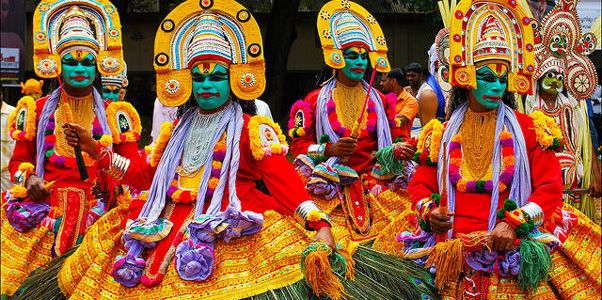- General
- Updated on October 9, 2025
The Psychology of Happiness According to Indian Traditions

Happiness is a universal pursuit, yet its definition and path vary across cultures. In India, happiness is not merely an emotional state but a holistic balance of mind, body, and spirit. Rooted in ancient philosophies, Indian traditions offer profound insights into understanding and cultivating lasting joy.
Understanding Happiness in the Indian Context
Unlike Western psychology, which often emphasizes external achievements as a source of happiness, Indian traditions focus on inner well-being and self-realization. Classical texts such as the Bhagavad Gita, Upanishads, and Yoga Sutras of Patanjali highlight that true happiness arises from self-awareness, detachment from material desires, and alignment with dharma (one’s righteous duty).

The Role of Dharma in Mental Well-Being
Dharma, often translated as “righteous duty,” is central to Indian philosophy. When individuals act according to their dharma, they experience a sense of purpose and fulfillment. Psychologically, this mirrors modern positive psychology’s emphasis on meaningful engagement as a key component of happiness.
Living in alignment with dharma fosters reduced stress, clarity of mind, and emotional balance, all of which contribute to a sustainable sense of happiness.
Mindfulness and Meditation Practices
Indian traditions have long emphasized mindfulness and meditation as tools to cultivate inner peace. Techniques like dhyana (meditation) and pranayama (controlled breathing) help calm the mind, improve focus, and reduce emotional turbulence.
Meditation not only strengthens the mind but also increases awareness of the present moment. Studies in modern psychology have validated that mindfulness practices can reduce anxiety and depression while enhancing overall well-being.
The Science Behind Meditation and Happiness
Scientific research confirms that regular meditation enhances serotonin production and reduces cortisol levels, leading to improved mood and resilience. This aligns perfectly with the ancient Indian understanding that the mind’s clarity is essential for true happiness.
Karma and Emotional Resilience
The concept of karma, or the law of cause and effect, encourages individuals to focus on their actions rather than obsess over outcomes. By embracing karma yoga (selfless action), one learns to perform duties without attachment to results, fostering emotional resilience.
This principle teaches that happiness is not dependent on external success but on attitude and intent, reinforcing a sense of control over one’s emotional state.
Selfless Service and Social Happiness
Acts of seva (selfless service) are a cornerstone of Indian traditions. Helping others not only cultivates compassion but also generates a profound sense of fulfillment and joy. Psychologically, altruistic behaviors activate reward centers in the brain, promoting long-term happiness.
Detachment and Contentment
Indian philosophies encourage vairagya (detachment)—a balanced perspective toward desires and possessions. Detachment does not mean renunciation of life but cultivating contentment regardless of circumstances.
Practicing contentment reduces anxiety, jealousy, and dissatisfaction, enabling individuals to appreciate life’s simple joys.
Gratitude Practices in Indian Traditions
Gratitude is integral to Indian spiritual practices. Daily prayers, offerings, and reflections foster appreciation for life’s abundance. Modern studies show that gratitude enhances mental health, strengthens relationships, and improves overall life satisfaction.
Balance of Body and Mind
Indian traditions highlight the mind-body connection as essential for happiness. Ayurveda, India’s ancient medical system, emphasizes dosha balance and healthy living habits. A balanced diet, proper sleep, exercise, and seasonal routines contribute to both physical vitality and mental well-being.
Yoga and Physical Happiness
Yoga combines physical postures, breathing exercises, and meditation to harmonize the body and mind. Regular practice reduces stress, improves flexibility, and cultivates inner calm—all contributing to a sense of happiness that is deep and enduring.
Happiness Beyond Materialism
Indian psychology views material wealth as a temporary source of pleasure, not lasting happiness. True joy comes from inner harmony, meaningful relationships, and spiritual growth. This perspective encourages individuals to seek satisfaction in experiences, learning, and self-development rather than external possessions.
Festivals and Collective Joy
Cultural celebrations in India, such as Diwali, Holi, and Pongal, reflect the social dimension of happiness. Participating in communal rituals and traditions strengthens social bonds, instills a sense of belonging, and boosts emotional well-being.
Applying Indian Traditions to Modern Life
Integrating Indian philosophical principles into contemporary life can enhance mental health and happiness. Practical approaches include:
- Daily meditation and mindfulness practices for mental clarity.
- Acts of kindness and community service to foster joy.
- Setting intentions aligned with personal values (dharma).
- Practicing gratitude and contentment to manage stress and comparison.
- Maintaining a healthy lifestyle through balanced diet, exercise, and sleep.
These timeless practices are increasingly supported by psychological research, proving that ancient wisdom is highly relevant to modern mental health.
Read Also: The Indian Culture And Traditions – About India
Conclusion
The psychology of happiness according to Indian traditions offers a holistic, enduring approach to well-being. By focusing on self-awareness, mindfulness, altruism, and balance, individuals can cultivate happiness that transcends fleeting pleasures. Modern science continues to validate these principles, making Indian traditions a valuable guide for anyone seeking emotional resilience and lasting joy in life.
Join the discussion
Related Articles
No results available
ResetTrending Articles


- General
- Updated on December 5, 2025


- General
- Updated on December 2, 2025


- General
- Updated on December 5, 2025


- General
- Updated on November 27, 2025


- Health
- Updated on November 24, 2025


- General
- Updated on November 24, 2025


- General
- Updated on November 19, 2025


- General
- Updated on November 19, 2025


- General
- Updated on November 14, 2025


- Tech
- Updated on November 12, 2025
No results available
Reset


